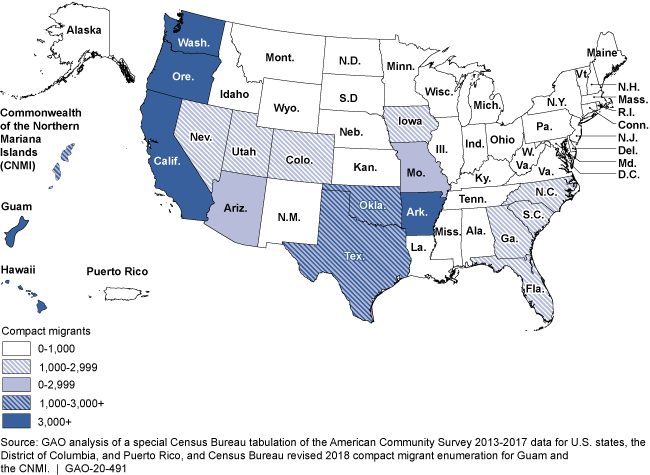US Ambassador Karen Stewart entered the first round of negotiations on May 27-28, 2020 with leaders from the Republic of the Marshall Islands, the Federated States of Micronesia, and the Republic of Palau on the Compacts of Free Association. These countries have been compact partners with the United States since the 1980s, and the relationships matter for America culturally, economically, and for national security. From 2008-2018 the United States invested $14.3 billion into theses Pacific Island economies, and in turn, the islands provide licensed US fishermen access through the sale of access to 30% of the world’s tuna supply as permitted under the Nauru Agreement.
The US Government Accountability Office reports that twenty US states and territories are home to at least 1,000 migrants from these countries with Compacts of Free Association. Should these countries decide to end the compacts, tens of thousands of Pacific Islanders in the United States would “lose their legal status” and potentially face forced repatriation.

The Marshall Islands signed a compact with the United States in 1983, and after the 2003 renegotiation, the United States became responsible for the islands’ security and defense. Additionally, Marshallese citizens are eligible to work, live, and study in the United States, and serve in the US military. US total FDI in the Marshall Islands reached $3.3 billion in 2018, and in turn, the Marshall Islands exports $39 million to the United States annually. Arkansas is home to the most significant population of Marshallese immigrants at around 15,000, compared to the islands’ total population of 53,000. Home to one of the few Marshallese consulates in the United States, the town of Springdale supports 30 Marshallese churches, and a radio station. Should the compact end, 27,000 Marshallese would lose their legal status.
The Federated States of Micronesia (FSM) entered a compact with the United States in 1986 with renegotiation in 2004. US total FDI in the FSM for the private industry reached $1 million in 2017, and the US government provides $110 million in assistance on an annual basis to ensure the island's development. Hawai‘i and Guam are home to the largest groups of relocated Micronesians, outside of these locations thousands of Micronesians currently reside in the Pacific Northwest. Coming to the United States has inspired many Micronesians to join the armed services, and studies show that Micronesians serve in the US military at a per capita rate nearly double that of US citizens.
Lastly, Palau entered a compact with the United States in 1982, and under its terms, the US is responsible for the island’s defense until 2044, and currently around 500 Palauan’s serve in the US armed services. After the 2010 review of the compact, the US government established the Compact Trust Fund to promote the economic development of the island. The private sector has also contributed to the island’s development as US direct investment totaled $10 million as of 2018. Additionally, the City of Gilroy California has maintained a sister city relationship with Koror Palau since 1994, and boasts a consistent partnership programs that “Provide education and mutual understanding of culture and economics.”
To ensure a free and open Indo-Pacific, defense access is an important aspect of the United States relationship with all of the pacific island nations. To that end in 2019 the Marshall Islands was home to the joint multilateral Pacific Partnership search and rescue exercise alongside the local government. The US military also sent personnel to Palau for the first time in 37 years in April 2019 as part of the Pacific Pathways exercise aimed at coordinating military and humanitarian assistance capabilities. As the United States seeks to secure a Free and Open Indo-Pacific, the compact states and their citizens are “key partners” in ensuring regional security.
Charity Borg is a research intern in the Young Professionals Program at the East-West Center in Washington. She is a Captain in the United States Air Force and graduated from Northeastern University with a Master of Science degree in international relations in 2019.